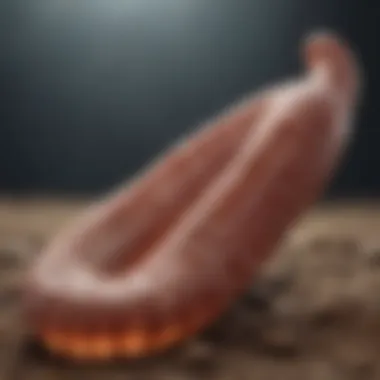Comprehensive Guide to Effective Home Remedies for Stomach Worms


Research Overview
Stomach worms are a common health issue that many individuals face. These parasitic infections can cause discomfort and disrupt daily life. This comprehensive guide delves into natural remedies that can effectively combat stomach worms. Through a detailed exploration of herbal solutions and dietary adjustments, this article aims to shed light on alternative treatments for stomach worm infestations. By providing valuable insights on home remedies, individuals can explore non-invasive methods to address this health concern.
Health Implications
The impact of stomach worms on health can be significant. From nutritional deficiencies to gastrointestinal disturbances, untreated stomach worms can lead to various health complications. This section delves into the potential benefits and risks associated with stomach worm infestations. By understanding the health implications of these parasites, individuals can take proactive measures to safeguard their well-being. Practical examples of how the findings can be applied in daily life will be discussed to empower readers with actionable insights.
Well-being Strategies
Incorporating effective well-being strategies is essential when managing stomach worms. This section offers practical tips derived from research to combat stomach worm infestations naturally. From dietary modifications to lifestyle adjustments, readers will discover actionable advice on implementing positive changes for their well-being. Personal stories or case studies supporting these strategies will be shared to showcase real-life applications and inspire individuals to embark on their own health journey.
Expert Insights
Expert opinions play a vital role in understanding the nuances of stomach worm infestations. In this section, the analysis of expert perspectives on the research findings will be presented. A Q&A session with a relevant expert in the field will provide readers with in-depth insights and clarify any queries they may have. By tapping into expert knowledge and experience, individuals can gain a comprehensive understanding of stomach worms and make informed decisions regarding their health.
Understanding Stomach Worms
Stomach worms, a common ailment affecting many individuals globally, pose a significant health concern that demands attention and understanding. In this article, the focus lies on unraveling the intricacies of stomach worms, shedding light on their nature, impact, and treatment options. Understanding stomach worms is crucial in combating infestations effectively, as it empowers individuals to make informed decisions regarding their health and well-being. By delving into the specifics of stomach worms, readers can grasp the significance of early detection, prevention, and management strategies to alleviate the associated symptoms and promote overall gut health.
What Are Stomach Worms?


Stomach worms, scientifically known as helminths, are parasitic organisms that inhabit the gastrointestinal tract, specifically the stomach, causing a range of health issues. These worms vary in species and can include roundworms, tapeworms, and hookworms, among others. They typically enter the body through contaminated food or water and thrive in the conducive environment of the digestive system. The presence of stomach worms can lead to various symptoms such as abdominal discomfort, bloating, diarrhea, and nutrient deficiencies, highlighting the importance of prompt diagnosis and treatment.
Types of Stomach Worms
Stomach worms encompass a diverse array of species, each with distinct characteristics and effects on the human body. Common types of stomach worms include roundworms (Ascaris lumbricoides), tapeworms (Taenia solium), and hookworms (Necator americanus). Roundworms are transmitted through ingesting contaminated food or water, while tapeworms are often contracted by consuming undercooked meat. Hookworms, on the other hand, penetrate the skin and migrate to the intestines, where they cause complications. Understanding the types of stomach worms is essential for tailored treatment approaches that target specific parasites effectively.
Symptoms of Stomach Worm Infestation
The onset of stomach worm infestation manifests through a variety of symptoms that can vary in severity and duration. Common indicators of stomach worm presence may include abdominal pain, nausea, vomiting, fatigue, and unexplained weight loss. Detecting these symptoms early on is crucial for timely intervention and preventing complications associated with prolonged infestations. By recognizing the signs of stomach worm infestation, individuals can take proactive measures to seek appropriate treatment and adopt preventive strategies to safeguard their digestive health.
Traditional Herbal Remedies
In the domain of natural remedies for combatting stomach worms, traditional herbal remedies play a pivotal role. These remedies have been relied upon for generations due to their potent antiparasitic properties and minimal side effects compared to conventional medications. By incorporating traditional herbs into the treatment regimen, individuals can harness the power of nature to address stomach worm infestations effectively. The benefits of traditional herbal remedies lie in their ability to target parasites without harming the body's natural flora, offering a holistic approach to combating gastrointestinal parasites. Additionally, traditional herbal remedies like garlic, pumpkin seeds, and neem are readily available and cost-effective, making them accessible alternatives for individuals seeking natural solutions to their health concerns.
Garlic: Nature's Antiparasitic Agent
Garlic, known for its pungent aroma and distinct flavor, serves as nature's antiparasitic agent in the realm of traditional herbal remedies. This potent herb contains allicin, a compound that exhibits strong antiparasitic properties, making it effective in combating stomach worms. Consuming raw garlic or incorporating it into meals can help kill parasites and alleviate gastrointestinal discomfort associated with worm infestations. Furthermore, garlic boosts immune function, aiding the body in its fight against parasitic invaders. While garlic is generally safe for consumption, individuals with sensitivities should exercise caution and consult with a healthcare provider before integrating it into their treatment plan.
Pumpkin Seeds: A Natural Deworming Solution
Pumpkin seeds emerge as a natural deworming solution that offers a gentle yet effective approach to combating stomach worms. These seeds are rich in cucurbitacin, an amino acid that paralyzes parasites, preventing them from attaching to the intestinal lining. By incorporating pumpkin seeds into the diet, individuals can expel worms from their digestive tract naturally. Additionally, pumpkin seeds are packed with essential nutrients like zinc and magnesium, supporting overall digestive health during the deworming process. Consuming a handful of raw pumpkin seeds daily or grinding them into a paste can help eradicate stomach worms and promote intestinal wellness.
Neem: The Bitter Yet Beneficial Herb


Neem, characterized by its bitter taste and versatile medicinal properties, stands as a beneficial herb in the realm of traditional remedies for stomach worms. This herb contains compounds like azadirachtin and nimbin, which exhibit antiparasitic effects, making it a valuable ally in deworming treatments. Neem not only kills parasites but also helps cleanse the digestive system, promoting detoxification and alleviating symptoms of worm infestations. Whether consumed in the form of neem leaf capsules, neem tea, or neem oil, this bitter herb can aid in purging parasites from the body while supporting overall gastrointestinal health. However, individuals should be mindful of neem's potency and adjust their dosage as per recommendations to avoid adverse effects.
Dietary Adjustments
Dietary adjustments play a crucial role in combating stomach worms effectively. In this article, we will delve into the significance of dietary changes in managing stomach worm infestations. By focusing on specific elements such as fiber-rich foods, probiotic-rich foods, spicy foods, and warm water intake, individuals can support their bodies in fighting off parasitic infections. Dietary adjustments not only aid in deworming but also help in promoting overall gut health and well-being.
Fiber-Rich Foods: The Enemy of Stomach Worms
Fiber-rich foods are considered the nemesis of stomach worms. These foods, abundant in roughage and indigestible plant matter, create an inhospitable environment for parasites to thrive in the digestive tract. By consuming a diet high in fiber from sources like whole grains, fruits, and vegetables, individuals can effectively fend off stomach worm infestations. Furthermore, fiber helps in promoting regular bowel movements, aiding in the expulsion of parasites from the body. Including a variety of fiber-rich foods in the diet is essential for maintaining digestive health and preventing reinfestation.
Probiotic-Rich Foods: Supporting Gut Health
Probiotic-rich foods are instrumental in supporting gut health, which is crucial in fighting stomach worms. These foods contain beneficial bacteria that help restore the natural balance of the gut microbiota, enhancing digestive function and immune response. By incorporating probiotic sources such as yogurt, kefir, and fermented vegetables into their diet, individuals can strengthen their gut flora and reduce the risk of parasitic infections. Probiotics not only aid in deworming but also contribute to overall gastrointestinal well-being, fostering a resilient gut environment that is inhospitable to parasites.
Spicy Foods: A Natural Deworming Aid
Spicy foods, known for their antimicrobial and digestive properties, serve as a natural deworming aid. Ingredients like garlic, ginger, and chili peppers possess compounds that exhibit antiparasitic effects, helping to combat stomach worms effectively. Consuming spicy foods not only adds flavor to the diet but also assists in killing parasites and preventing their proliferation in the gut. Incorporating moderate amounts of spicy ingredients into meals can act as a preventive measure against parasitic infestations, contributing to overall digestive health.
Warm Water: A Simple yet Effective Solution
Warm water intake is a simple yet effective solution for dealing with stomach worms. Drinking warm water on an empty stomach in the morning helps in flushing out parasites from the digestive system. Warm water aids in maintaining hydration, promoting intestinal motility, and facilitating the elimination of waste material, including parasites. This practice not only supports deworming efforts but also aids in overall toxin removal and digestive cleansing. Including warm water consumption as a daily habit can contribute significantly to managing stomach worm infestations and promoting gastrointestinal well-being.


Lifestyle Changes
In the realm of combatting stomach worms, lifestyle changes play a crucial role in addressing and preventing infestations. By incorporating specific habits and adjustments, individuals can significantly improve their overall gastrointestinal health. These changes encompass various elements, including dietary modifications, hygiene practices, and hydration routines. Emphasizing lifestyle changes not only aids in treating existing stomach worm issues but also creates a hostile environment for parasites to thrive, thereby reducing the chances of reinfestation. Implementing regular lifestyle adjustments can bolster the body's natural defenses, promoting digestive wellness and immune system strength.
Hygiene Practices: Preventing Reinfestation
A key aspect of managing stomach worm infestations is maintaining meticulous hygiene practices to prevent reinfestation. Simple yet effective habits such as regular handwashing, proper food hygiene, and clean living spaces can significantly reduce the risk of worms spreading or reentering the body. Ensuring personal cleanliness and sanitation not only thwarts the transmission of parasites but also fosters overall well-being. By incorporating stringent hygiene practices into daily routines, individuals can safeguard themselves against potential stomach worm infections and promote a healthy living environment free from parasitic threats.
Adequate Water Intake: Flushing Out Parasites
Adequate water intake is paramount in flushing out parasites from the body and supporting gastrointestinal health. Staying hydrated promotes optimal digestion and helps in expelling harmful organisms like stomach worms. Water acts as a natural detoxifier, aiding in the elimination of toxins and parasites from the digestive system. By drinking sufficient water throughout the day, individuals can effectively flush out parasites, maintain hydration levels, and support overall gut function. Incorporating this simple yet powerful habit into daily life can aid in combating stomach worm infestations and promoting digestive well-being.
Consultation and Monitoring
In this section of our comprehensive guide on effective home remedies for stomach worms, we shed light on the crucial aspects of consultation and monitoring. When dealing with stomach worm infestations, seeking medical advice and proper monitoring are paramount. Consulting a healthcare professional is essential as they can provide a precise diagnosis based on symptoms and medical history. Furthermore, medical advice plays a pivotal role in determining the appropriate course of action for treatment. Monitoring is equally vital to track the progress of recovery and ensure the effectiveness of the chosen remedies.
Seeking Medical Advice
Professional Diagnosis
Professional diagnosis is an integral part of addressing stomach worm infestations effectively. Through professional diagnosis, healthcare providers conduct thorough examinations and tests to identify the specific type of worm infestation. This contributes to tailoring the treatment plan to target the particular parasite causing the infection. Professional diagnosis distinguishes between various types of stomach worms, such as roundworms, tapeworms, or hookworms, enabling the implementation of targeted therapies. Its accuracy and precision make it a preferred choice for individuals seeking reliable solutions for their condition. Despite its advantages, professional diagnosis may incur additional costs and require specialized medical expertise.
Prescribed Medications
Prescribed medications play a vital role in the treatment of stomach worm infestations. Healthcare providers may prescribe anthelmintic drugs, specifically designed to eradicate parasitic infections effectively. These medications target the worms directly, either paralyzing or killing them, thereby aiding in their elimination from the body. Prescribed medications offer a systematic approach to deworming, ensuring comprehensive treatment. While effective, prescribed medications may entail certain side effects, such as nausea or dizziness, which individuals need to be aware of. Adherence to the prescribed dosage and duration is crucial to maximize the efficacy of the medications and prevent potential resistance.
Monitoring Recovery Progress
Monitoring recovery progress is a vital step in the management of stomach worm infestations. Regular follow-ups with healthcare providers allow for tracking the response to treatment and making any necessary adjustments. Monitoring entails assessing symptoms, conducting follow-up tests to detect the presence of worms, and evaluating overall health improvements. It provides insights into the effectiveness of the chosen remedies and ensures that the treatment is yielding the desired outcomes. Additionally, monitoring recovery progress facilitates early detection of any potential complications or recurrences, enabling prompt intervention. By closely monitoring recovery progress, individuals can take proactive measures to safeguard their health and well-being.



